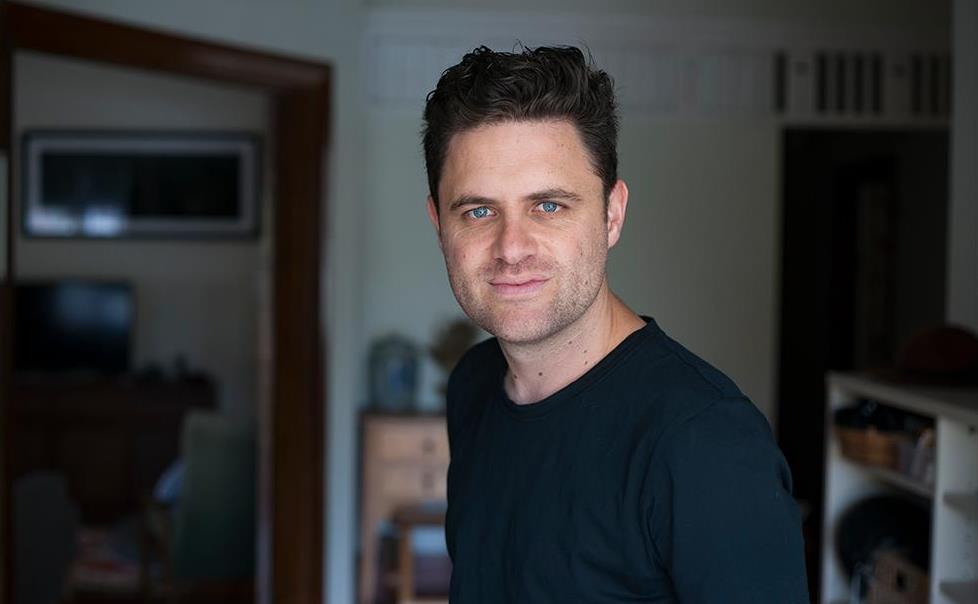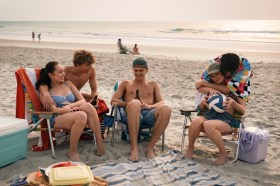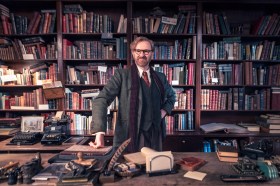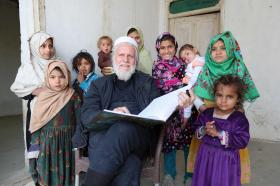‘If I start talking about Clickbait, I’m dead. In fact, there are probably red dots from snipers on me right now,’ jokes Christian White, undoubtedly Australia’s hottest young novelist and screenwriter of the moment. The only details he’s allowed to disclose about the eight-part Netflix Originals series he co-created, co-wrote and coproduces with showrunner Tony Ayres, are those already on record. ‘I try to memorise the press release word for word so I’m not in trouble,’ he says. ‘Things are very secretive in the film and TV world compared to the books world, probably because of the vast sums of money involved.’
White talks very very fast as we meet for a G&T before a book signing gig for his second novel, The Wife and the Widow, a page-turning literary murder mystery set in a wintry Victorian seaside town. He’s incredibly self-deprecating, perhaps to disarm the envy of all those struggling writers watching him live out their wildest dreams. He describes himself as ‘a terrible people pleaser’ and has a reputation as the nicest guy around. His instagram account consists entirely of photos of his rescued greyhound Issey, and he hasn’t updated his author website in years. Still, he’s never sweetly bland. Every story you read about him, including this one, will mention the fact that his previous odd jobs have included editing porn for an adult entertainment company.
‘I spent 15 or 16 years trying to break through, doing millions of these crazy odd jobs to support my writing habit,’ he says, ‘and now all of a sudden this is happening with the books and the TV series. It makes me worry that I was hit by a bus and now I’m in a coma and this is just a coma fantasy.’
Clickbait
Here’s what we do know about the Netflix series: It’s the first to be made in Victoria, and is due to start a seven-month shoot in Melbourne’s Docklands Studios and surrounds in November 2019. Clickbait is a character-based thriller told from multiple perspectives which, according to Netflix, ‘provide tantalizing clues to the perpetrator of a gruesome crime fueled by social media.’ The series, shot in Australia but set in the US, will be produced by Tony Ayres Productions (TAP) and Matchbox Pictures, together with UK production company Heyday Television for Netflix and NBC Universal. The Federal Government will put in $4.9 million through the Location Incentive program, while the Victorian Government will support it through Film Victoria’s Production Incentive Attraction Fund. Film Vic’s press release crows that this will bring in more than $36 million of international investment, will employ around 540 cast, crew and extras, and use the services of 290 local businesses.
No wonder it’s all a bit intimidating for the 38-year-old writer who grew up on the Mornington Peninsula, and recently moved back to the coast with that doted-upon dog and his filmmaker wife, Summer De Roche, with whom he credits many of his best ideas and plot twists. (Yes, she’s the daughter of the legendary late US-Australian screenwriter Everett De Roche of Patrick and Long Weekend fame.)
White only broke out of obscurity two years ago when he won the 2017 Wheeler Centre Victorian Premier’s Literary Award for Best Unpublished Manuscript. A bidding war between publishers saw Affirm Press come out on top to publish The Nowhere Child in June 2018. A mystery thriller about a stolen child, it quickly became Australia’s fastest selling debut fiction since BookScan records began, with rights sold to 16 territories around the world and a screen deal with Anonymous Content in the US and Carver Films in Australia. White has a four-book deal with Affirm and The Wife and the Widow followed on quickly from the first, releasing in October 2019. He jokes that he’s now very busy ‘pimping it’ just before the madness of Clickbait begins.
Becoming a Real Writer
White says he’s always been obsessed with the idea of being a writer of both novels and screenplays. ‘A model of mine was Alex Garland who wrote The Beach and a few other amazing novels, and now he just writes movies. To be able to move between those worlds, that was always my ideal.’
A true movie buff from way back, White says that as a younger man he used to get very anxious if he didn’t get to the cinema on the same day that new films came out. These days, he’s at least six months behind, a fact he largely credits to having adopted a dog with separation anxiety. ‘It’s taught me to relax a bit more and watch more television,’ he says, which is not a bad thing considering where most of the best work is these days for screenwriters. ‘My wife and I have this endless struggle because she always wants to watch movies, and when we got together I was the movie guy, but now there’s just too much good TV and it’s nice and cosy having characters to come back to.’
Read more: Meg Mundell’s ‘The Trespassers’ from page to screen
White was ambitious right from an early age, and ‘stunned not to be successful at 25’. He kept plugging on year after year, did a few short courses and eventually studied screenwriting at RMIT, while also reading any script he could get his hands on. In the meantime, he was also busy trying to write novels. ‘The idea was to just cast out a wide net and whatever nipped at the line first, that’s what I would go for. To be honest, I thought being a screenwriter was slightly more realistic and achievable than writing books.’
He admits he’s ‘a real structure geek’, and that even as a novelist, he finishes every chapter as if he’s cutting to a commercial break, which perhaps explains the page-turning success of his thrillers, which both feature remarkably believable female protagonists. ‘A lot of people shy away from formula and genre and think it’s a bad word, but I love it,’ he says. ‘It exists for a reason and is part of our evolution. It’s what we expect from stories. You can subvert that or use it as a safety net to guide you towards what happens next, and I really lean into that.’
Going to RMIT and formally learning about story structure was transformative for White. ‘Everyone has a sense of story, but being taught those things that you on some level already knew, but needed to hear out loud, completely changed my life. It taught me structure and dialogue and technical skills, but it also it taught me how to start getting my work out there. That was always the big problem of mine.’
Fears and phantoms
White says he’s never had writer’s block because he loves the actual craft of it so much, ‘but where I struggled was just showing people my work.’
‘I think it was a fear of failure but more a fear of destroying this fantasy I had about being published and having a career in film and TV,’ he says. ‘My first book was the fifth manuscript I tried to write, and the second one I finished, and the first I thought was good enough to show anyone. In my desktop and drawers I’ve got at least three or four feature films that I’ve written completely and been proud of and then never shown anyone, for some weird weird reason! It’s this bizarre mixture of fear of failure and imposter syndrome. It wasn’t until I decided that I had to try and fail and be accountable to myself, instead of doing nothing, that I started to get somewhere.’
‘I think it was a fear of failure but more a fear of destroying this fantasy I had about being published and having a career in film and TV.’
Actually submitting his work to be read and judged in competitions was part of this accountability and it’s paid handsome dividends, and not just with the Premier’s Literary Award. The origins of White’s collaboration with Tony Ayres, a key industry mover and shaker and founder of Matchbox, began in 2013 when White won the Australian Writers’ Guild’s inaugural TV drama screenwriting competition ‘Think inside the Box’ with his series pilot One Year Later. One of the prizes was a meeting with the production company.
‘I went into Matchbox and everyone was completely lovely,’ he remembers, ‘but I was convinced I’d screwed it up by being so nervous and terrible, and then suddenly I got an email from Tony. He’s so supportive of new people and so I started working with him on a few projects, and learning so much from him, even in one day in a writers’ room. I credit him not just with taking a huge chance on me, as he has on so many other people, but on teaching me to be a better writer through action and demonstration.’
White worked in a number of writers’ rooms including as a note-taker on Seven Types of Ambiguity and as a researcher on Barracuda. ‘Being in a writers’ room now and getting notes, I realise how terrible I was at doing it,’ he says laughing. ‘It was just this dreadful stream of consciousness on the page. A completely different skill from actually writing.’
Though that initial AWGIE-winning pilot script never went anywhere, in recent years White has written other screenplays, including for the short film Creswick, which he co-wrote with director Natalie Erika James, and which won Best Short Form Script at the 2017 Australian Writers Guild Awards. Creswick eventually became a proof of concept for the horror film Relic, also co-written by White, and directed by James, and starring Robyn Nevin, Emily Mortimer and Bella Heathcote. Shot in Victoria and set to release in 2020, distributed by Umbrella, Relic was produced by Carver Films’ Anna Macleish and Sarah Shaw (Snowtown, Partisan) and Nine Stories’ Jake Gyllenhaal and Riva Marker.
‘Relic is about three generations of women dealing with this shadow of dementia, and what if dementia was manifested as a real monster?’ White explains. The idea for the story came because both he and James were dealing with the issue with their grandparents. ‘It’s terrifying and emotional, dealing with this thing that is maybe coming for us and lying dormant in our genes.’

Writer-director Natalie James and co-writer Christian White on the set of ‘Relic’. Supplied.
It was on the set of Relic that he first saw the impact of his words made real. ‘I remember going to the film set and it was almost so big I couldn’t take it all in. And then I saw this tiny strip of stained glass window above a fake bathroom door. And I remembered writing that into the script. And I thought, wow, someone had to do that. It’s a real thing!’
So, does Christian White consider himself as an artist? He pauses for a moment. ‘I think being a writer is being an artist, but I’m always writing with an audience in mind. I want people to read it and I want people to like it. I want my stuff to be commercial. I know that’s a bit of a dirty word because you’re not supposed to care what the critics or audiences say, but I do!’ He laughs, and then adds, ‘God, I just gave you such a politician’s answer, didn’t I?’
Not really. It’s actually a very good look for any screenwriter to care so deeply about an audience.
Top Tips from Christian White
- Read a lot.
- Write a lot. (These are the most boring things, I know. It’s like when someone asks you how to lose weight and you have to say, “I’m sorry but the answer is just to eat well and exercise!)
- My first draft is always horrible but you need to get it out without too much judgement or distraction. I like what Stephen King says about writing with the door closed and re-writing with the door open.
- Hit send on that email! Just don’t wait until everything is perfect, because I don’t think anyone’s looking for a perfect script or perfect manuscript. They’re looking for something that they can add their own voice to, something they can help make better. That’s something I’ve learnt on the other side of things. I wish I’d known that, because I wasted a decade not showing anyone anything because it wasn’t perfect.
- Even the rejections will help you if you’re smart about it so just get your stuff out there.
- Producers are looking for stories! In the screenwriting world there are tonnes of producers who are looking for stuff. There’s this idea that as a writer, no one’s going to read your stuff and you’ve got to beg producers to read your stuff. But in reality there are so many amazing producers who are looking for good stories and they don’t care who you are, if your story is good they’ll create a relationship with you.
- If you find yourself in a writers’ room, concentrate and pay attention. If your idea gets shot down, don’t sulk. Move on and don’t be too sensitive. You’ll learn that in a writers’ room you can get somewhere in 20 minutes that it would have taken you weeks on your own because you’ve got all these genius minds at work. Check your ego and watch what established writers do.
- Don’t be a dickhead. Fifty per cent of being a good writer is obviously being committed to the craft, but the other 50 per cent is just not being a dickhead. Check your ego and keep an eye on what more established writers do.





